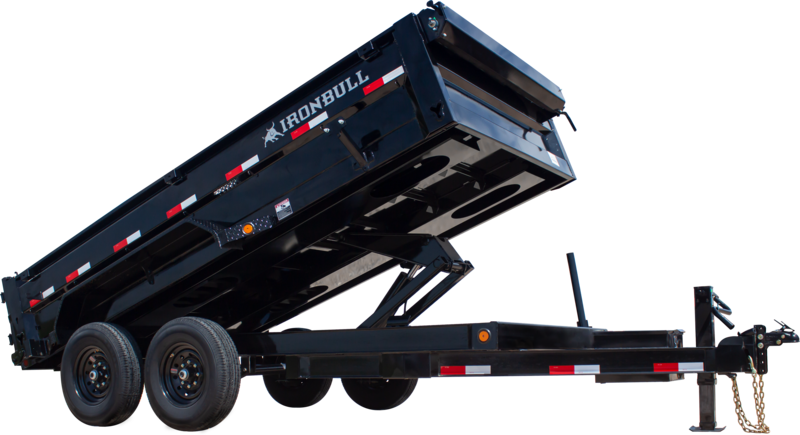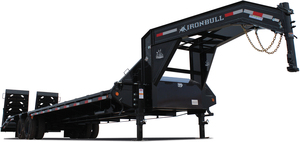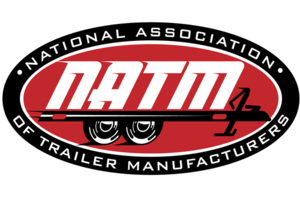What is GVWR and GAWR and how are these terms important in the trailer industry?
GVWR (Gross Vehicle Weight Rating) and GAWR (Gross Axle Weight Rating) are terms used in the transportation industry to indicate weight limits for vehicles/trailers and their individual axles.

GVWR (Gross Vehicle Weight Rating):
• Definition: GVWR is the maximum weight a fully loaded trailer is rated to safely carry, including its own weight and the weight of passengers and cargo.
• Components: GVWR encompasses the entire trailer, including the chassis, body, engine, fuel, fluids, passengers, and cargo.
• Purpose: GVWR is crucial for ensuring that a trailer does not exceed its design capacity, promoting safety and preventing structural damage, brake failure, or other issues related to overloading.
GAWR (Gross Axle Weight Rating):
• Definition: GAWR is the maximum weight that an individual axle is rated to safely support.
• Components: GAWR considers the weight supported by each axle, including the weight of the tires, wheels, brakes, and any part of the trailer’s body or chassis directly supported by that axle.
• Purpose: GAWR is essential for preventing overloading on specific axles, which could lead to axle or suspension system failure, reduced braking efficiency, and other safety concerns.

Difference:
• The main difference between GVWR and GAWR is in their scope:
• GVWR applies to the entire trailer and represents the maximum weight the trailer can safely handle.
• GAWR focuses on individual axles and specifies the maximum weight each axle can support without compromising safety and performance.
Both GVWR and GAWR are crucial specifications for trailer owners and operators to understand, as exceeding these weight ratings can have serious safety implications and may result in fines or other legal consequences. Manufacturers determine these ratings based on extensive testing and engineering considerations to ensure the safe operation of the trailer under various conditions.
Knowing the Gross Vehicle Weight Rating (GVWR) is crucial for several reasons, all of which revolve around ensuring safety, compliance with regulations, and the proper functioning of a trailer. Here are key reasons why knowing GVWR is important:

• Safety: GVWR is a safety standard designed to prevent overloading, which can lead to various issues such as brake failure, suspension problems, tire blowouts, and compromised handling. Operating a trailer beyond its GVWR can significantly increase the risk of accidents and jeopardize the safety of passengers and other road users.
• Legal Compliance: Many regions have regulations that restrict the maximum weight a trailer can carry. Knowing and adhering to the GVWR is essential for legal compliance. Overloaded vehicles can incur fines and penalties, and drivers may be subject to legal consequences.
• Equipment Longevity: Exceeding the GVWR puts additional stress on various components of the trailer, including the suspension system, brakes, tires, and transmission. Over time, this can lead to accelerated wear and tear, reducing the lifespan of critical components and increasing maintenance costs.
• Manufacturer’s Warranty: Operating a trailer beyond its GVWR may void the manufacturer’s warranty. Warranty coverage is typically based on the assumption that the trailer is used within specified weight limits and under normal operating conditions. Exceeding these limits may result in warranty claims being denied.
• Fuel Efficiency: Overloaded trailers generally have reduced fuel efficiency. Knowing and adhering to the GVWR can help optimize fuel consumption and reduce operational costs.
• Insurance Implications: Operating a trailer beyond its GVWR may affect insurance coverage. In the event of an accident, insurance companies may investigate and potentially deny a claim if the trailer was overloaded, as it represents a violation of safety and legal standards.
• Road Infrastructure Protection: Overloaded trailers can cause damage to roads and bridges. Adhering to the GVWR helps protect the infrastructure and minimizes the public cost of road maintenance.
Understanding and adhering to the GVWR is crucial for promoting safety, legal compliance, and the efficient operation of a trailer. It is a key responsibility for drivers, fleet operators, and anyone involved in the transportation of goods and passengers.













































